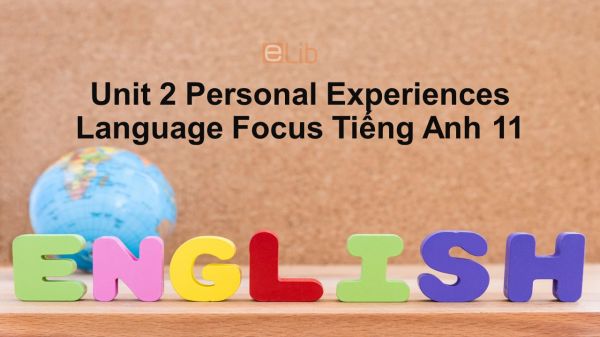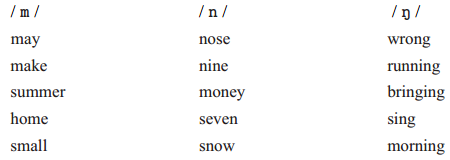Unit 2 lớp 11: Personal Experiences-Language Focus
Bài học Unit 2 lớp 11 Personal Experiences phần Language Focus hướng dẫn các em ôn tập điểm ngữ pháp về các thì hiện tại đơn, quá khứ đơn, quá khứ tiếp diễn và quá khứ hoàn thành.
Mục lục nội dung

1. Pronunciation Unit 2 lớp 11
Pronunciation /m/ - /n/ - /g/
- Listen and repeat (Nghe và lặp lại)

- Practise reading aloud these sentences (Thực hành đọc to những câu này)
1. Good morning. I want an apartment in central London.
2. We have an inexpensive apartment in Northend Avenue.
3. I remember meeting him on a nice summer afternoon.
4. Mr. King is singing next door.
5. He’s holding a string in his fingers.
6. He loves spending his holidays in his small summer house.
Tạm dịch
1. Chào buổi sáng. Tôi muốn một căn hộ ở trung tâm Luân Đôn.
2. Chúng tôi có một căn hộ đắt tiền trên đại lộ Northend.
3. Tôi nhớ đã gặp anh ấy vào một chiều hè thật đẹp.
4. Ông King đang hát ở nhà bên cạnh.
5. Anh ấy đang cầm một xâu chuối trong tay.
6. Anh ấy thích trải qua kỳ nghỉ trong ngôi nhà mùa hè nhỏ của mình.
2. Grammar
Present simple indicating past time (Thì hiện tại đơn chỉ về quá khứ)
Tense revision: the past simple, past progressive and past perfect (Ôn tập về thì: quá khứ đơn, quá khứ tiếp diễn và quá khứ hoàn thành)
2.1. Exercise 1 Unit 2 lớp 11
Use the correct present tense forms of the verbs in brackets in the story below. The first one has been done for you as an example (Sử dụng dạng thì hiện tại đơn đúng của các động từ trong ngoặc ở câu chuyện bên dưới. Động từ đầu tiên đã được làm sẵn làm ví dụ cho bạn)
The story is about a girl called Little Red Riding Hood who (0. live) lives with her mother. Little Red Riding Hood’s grandmother(1. invite)______her to her cottage, so one fine day she (2. set)______off to visit her. The little girl (3. get)______ready,(4. wave)______goodbye to her mother and (5. promise)______to be careful. On her arm she (6. carry)______a basket which (7. contain)______a cake her mother (8. bake)______specially. It (9. be)______a lovely spring morning, the sun (10. shine)______and the birds (11. sing)______feeling happy that the winter (12. be)______over.
Guide to answer
1. invites
2. sets
3. gets
4. waves
5. promises
6. carries
7. contains
8. has baked
9. is
10. is shining
11. are singing
12. is
Tạm dịch
Câu chuyện kể về một cô bé được gọi là Cô bé quàng khăn đỏ người mà sống cùng với mẹ. Bà của cô bé quàng khăn đỏ mời cô bé đến nhà bà chơi, vì vậy một ngày đẹp trời cô bé khởi hành đến thăm bà. Cô gái nhỏ sẵn sàng, chào tạm biệt mẹ và hứa sẽ cẩn thận. Trên tay cô bé mang chiếc giỏ đựng bánh mà mẹ cô bé đã nướng riêng cho bà. Đó là một buổi sáng mùa xuân đẹp trời, mặt trời chiếu sáng và chim hót vang cảm thấy vui khi mùa đông đã qua đi.
2.2. Exercise 2 Unit 2 lớp 11
Complete the sentences by putting the verbs into the past simple or past progressive (Hoàn thành câu bằng cách chia các động từ ở thì quá khứ đơn hoặc quá khứ tiếp diễn)
Examples
Do you like this picture? My uncle______it. (paint)
- Do you like this picture? My uncle painted it.
- Bạn có thích bức tranh này không? Chú mình đã vẽ nó.
We______lunch when we______the news. (have, hear)
- We were having lunch when we heard the news.
- Chúng tôi đang ăn trưa thì nghe được tin.
1. He______his arm when he______football. (break, play)
He broke his arm when he was playing football. (Anh ấy gãy tay khi đang chơi bóng đá.)
2. Julia______her first novel when she______19 years old. (write, be)
Julia wrote her first novel when she was 19 years old. (Julia đã viết quyển tiểu thuyết đầu tay năm 19 tuổi.)
3. I______on the computer when the fire______out. (work, break)
I was working on the computer when the fire broke out. (Tôi đang làm việc trên máy tính thì lửa bùng cháy.)
4. When it______to rain, they______through the forest. (start, walk)
When it started to rain, they were walking through the forest. (Khi trời mưa họ đang đi bộ qua cánh rừng.)
5. He______us about his marriage when we……afternoon tea. (tell, have)
He told us about his marriage when we were having afternoon tea. (Anh ấy kể cho chúng tôi nghe về hôn nhân của anh ấy khi chúng tôi đang uống trà chiều.)
6. Sorry, I_____to you. I______ about something else. (not listen, think)
Sorry, I didn't listen to you. I was thinking about something else. (Xin lỗi. Tôi đã không nghe bạn. Tôi đang nghĩ về việc khác.)
7. I______you last night, but you______. What______you? (phone, not answer, do)
I phoned you last night, but you didn't answer. What were you doing? (Tôi qua tôi gọi cho bạn nhưng bạn đã không trả lời. Bạn đang làm gì?)
8. Mary______her glasses at the time, so she______what kind of car the man______. (not wear, not notice, drive)
Mary was not wearing her glasses at the time, so she didn't notice what kind of car the man was driving. (Mary đã không đeo kính nên đã không chú ý đến loại xe ô tô mà người đàn ông đang lái.)
2.3. Exercise 3 Unit 2 lớp 11
Write the sentences, putting the verbs in each sentence into the past simple or the past perfect (Viết câu, chia động từ trong mỗi câu ở thì quá khứ đơn hoặc quá khứ hoàn thành)
Example
When the police (arrive), the car (go).
- When the police arrived, the car had gone. (Khi cảnh sát đến ô tô đã đi rồi.)
- Quá khứ hoàn thành nhấn mạnh vào hành động đã diễn ra được một khoảng thời gian trong quá khứ rồi và đã kết thúc trước khi hành động nào đó xảy ra
1. They (eat) everything by the time I (arrive) at the party.
had eaten/ arrived
Tạm dịch: Họ đã ăn hết mọi thứ khi tôi đến bữa tiệc.
2. When I (find) my purse, someone (take) the money out of it.
found/ had taken
Tạm dịch: Khi tôi tìm thấy ví, ai đó đã lấy hết tiền trong đó.
3. By the time I (get) into town, the shops (close).
got/ had closed
Tạm dịch: Khi tôi đến thị trấn, cửa hàng đã đóng cửa.
4. When they (get) to the station, the train (leave).
got/ had left
Tạm dịch: Khi tôi đến nhà ga, tàu hỏa đã đi rồi.
5. By the time you (get) her letter, she (arrive) in Paris.
got/ had arrived
Tạm dịch: Khi bạn nhận được bức thư, cô ấy đã đến Pari rồi.
6. The police (pay) no attention to Clare’s complaint because she (phone) them so many times before.
paid/ had phoned
Tạm dịch: Cảnh sát chú ý đến phàn nàn của Clare vì cô ấy đã gọi cho họ nhiều lần trước đây.
7. I (go) to the post office to ask about my package, but they (say) that it (not arrive) yet.
went/ said/ hadn't arrived
Tạm dịch: Tôi đến bưu điện để hỏi về bưu phẩm nhưng họ nói nó vẫn chưa đến.
8. When I (look) at the new dress for half an hour, I (ask) how much it (cost).
had looked/ asked/ cost
Tạm dịch: Khi đã nhìn chiếc đầm mới khoảng nửa giờ, tôi hỏi nó gia bao nhiêu.
3. Practice Task 1
Complete these sentences using the verb given. Use the past simple or the past perfect (Hoàn thành những câu sau sử dụng từ cho trước. Dùng thì quá khứ đơn hay quá khứ hoàn thành)
1. As Geoff was introduced to Mrs Snape, he ________ (realize) that he ________ (meet) her before.
2. During the previous week, I ________ (go) to the gym every morning.
3. By the time I _____ (get) back to the bathroom, the bath ______ (overflow).
4. The boy told me that he ________ (lose) his train ticket and ________ (not/ know) how he would get home.
5. I was just about to leave when I ________ (remember) my briefcase.
6. She _______ (walk) into the station only to find that the train _____ (leave).
7. At the conference, scientists reported that they ________ (find) a cure for Malaria.
8. On my last visit to Wixton I ________ (find) that the village ________ (not change) much.
9. In a surprise move, the Prime Minister ________ (resign) last night.
10. Jane didn't want any dinner. She ________ (eat) already.
11. When she _______ (come) into the hall, everyone _______ (start) cheering.
12. After they ________ (eat) all the food, they ________ (pick) up their bags and left.
13. I thought I would get to the restaurant first, but Jim _____ (arrive) before me.
14. By the time I ________ (get) to the party, most people________ (go) home.
15. As soon as I _______ (turn) the ignition key, the engine ______ (catch) fire.
4. Practice Task 2
Choose the word or phrase -a, b, c, or d - that best fits the blank space in each sentence (Chọn từ hay cụm từ phù hợp để điền vào chỗ trống sau đây)
1. Before he turned 14, Mozart ________ a few lesser piece for the piano.
a. has composed b. had composed
c. was composed d. would composed
2. He was busy________ his homework.
a. to do b. doing
c. for doing d. that he was doing
3. Rarely________ succeed in ballet if they start after the age of 12
a. do children b. children have
c. children d. are children
4. Have something to eat before you________.
a. leave b. left
c. will leave d. had left
5. ________ this holiday for ages.
a. We're looking forward to
b. We looked forward to
c. We look forward to
d. We've looked forward to
6. ________ hard all year, so I felt that I deserved a holiday.
a. I work b. I worked
c. I'd been working d. I've worked
7. The traffic lights ________ green and I pulled away.
a. turned b. were turning
c. has turned d. had turned
8. How fast________ when the accident happened?
a. are you driving b. were you driving
c. did you drive d. had you driven
Để ôn tập lại các kiến thức về từ vựng và ngữ pháp, mời cá em đến với đề kiểm tra trắc nghiệm Unit 2 Language Focus Tiếng Anh 11 sau đây và cùng luyện tập.
6. Conclusion
- The simple past (Thì quá khứ đơn)
a. Cách dùng
Thì quá khứ đơn (The simple past) được dùng thường xuyên để diễn tả:
- Sự việc diễn ra trong một thời gian cụ thể trong quá khứ và đã kết thúc ở hiện tại
She came back last Friday. (Cô ấy đã trở lại từ thứ sáu tuần trước.)
I saw her in the street. (Tôi đã gặp cô ấy trên đường.)
- Sự việc diễn ra trong một khoảng thời gian trong quá khứ và đã kết thúc ở hiện lại
She lived in Tokyo for seven years. (Cô ấy đã sống ở Tokyo trong 7 năm.)
They were in London from Monday to Thursday of last week. (Tuần vừa rồi họ ở London từ thứ hai đến thứ năm.)
- Các cụm từ thưởng dùng với thì quá khứ đơn: yesterday, (two days, three weeks) ago, last (year, month, week), in (2002, June), from (March) to (June), in the(2000, 1980s), in the last century, in the past
b. Cấu trúc
S + did+ V (+ O)
She came back last Friday. (Cô ấy quay lại hôm thứ sáu tuần trước.)
S + did not/didn't+V (+ O)
I asked her but she didn't know anything. (Tôi đã hỏi cô ấy nhưng cô ấy không biết gì cả.)
They were not in London from Monday to Thursday of last week. (Họ không ở London từ thứ hai đến thứ năm tuần trước.)
(Từ để hỏi) + did not/didn't + V+(0)
(Từ để hỏi) + did + V + not + (O)
When did she come back? (Khi nào cô ấy trở lại?)
Were they in London from Monday to Thursday of last week? (Họ ở London từ thứ hai đến thứ năm tuần trước sao?)
- Thì quá khứ tiếp diễn
a. Cách dùng
Chúng ta dùng thì quá khứ tiếp diễn khi muốn nhấn mạnh diễn biến hay quá trình của sự vật hay sự việc hoặc thời gian sự vật hay sự việc đó diễn ra. (Nếu chúng ta chi muốn nói về một sự việc nào đó trong quá khứ thì chúng ta có thể sử dụng thì quá khứ đơn)
While I was driving home, Peter was trying desperately to contact me. (Peter đã cố gắng liên lạc với tôi trong lúc tôi đang lái xe về nhà.)
Were you expecting any visitors? (Anh có mong đợi người khách nào không?)
I was just making some coffee. (Tôi đang pha cà phê.)
What were you doing at 9.00 last night? (Bạn đã đang làm gì vào lúc 9 giờ tối qua?)
Chúng ta dùng thì quá khứ tiếp diễn để diễn tả một hành động đang diễn ra trong quá khứ thì có hành động khác xen vào.
I was walking in the street when I suddenly fell over. (Khi tôi đang đi trên đường thi bỗng nhiên tôi bị vấp ngã.)
They were still waiting for the plane when I spoke to them. (Khi tôi nói chuyện với họ thì họ vẫn đang chờ máy bay.)
We were just talking about it before you arrived. (Chúng tôi vừa nhắc về điều đó trước khi anh đến.)
b. Cấu trúc
Câu khẳng định: S + was/ were + V-ing (+0)
I was thinking about you the other day. (Mấy ngày gần đây tôi đã nghĩ về anh.)
We were just talking about it before you arrived. (Chúng tôi chỉ nói về nó trước khi bạn đến.)
Câu phủ định: S + was/ were + not + V-ing (+ O)
I wasn't thinking about him last night. (Tôi đã không nghĩ về anh ta đêm qua.)
We were not talking about it before you arrived. (Chúng tôi đã không nói về nó trước khi bạn đến.)
Câu nghi vấn: (Từ để hỏi) + want/were + S + V-ing (+ O)?
Were you expecting that to happen? (Anh đã mong điều gì đã xảy ra?)
c. Khi dùng cả hai thì này trong câu một câu thì chúng ta dùng thì quá khứ tiếp diễn để chỉ hành động hay sự việc nền và thì quá khứ đơn để chỉ hành động hay sự việc xảy ra và kết thúc trong thời gian ngắn hơn.
It was raining hard when we left the building. (Khi chúng tôi ra khỏi tòa nhà thì trời đang mưa rất lo )
I was reading the report when you rang. (Tôi đang xem báo cáo thì anh gọi.)
He was going out to lunch when I saw him. (Khi tôi gặp anh ấy thì anh ấy đang ra ngoài đế ăn trưa.)
The company was doing well when I last visited it. (Lần cuối cùng tôi đến thăm công ty thì lúc đó công ty đang làm ăn rất tốt.)
Tham khảo thêm
- doc Unit 2 lớp 11: Personal Experiences-Reading
- doc Unit 2 lớp 11: Personal Experiences-Speaking
- doc Unit 2 lớp 11: Personal Experiences-Listening
- doc Unit 2 lớp 11: Personal Experiences-Writing



